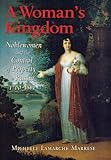A Woman's Kingdom : Noblewomen and the Control of Property in Russia, 1700-1861.
Material type: TextPublication details: Ithaca : Cornell University Press, 2018.Description: 1 online resource (293 pages)Content type:
TextPublication details: Ithaca : Cornell University Press, 2018.Description: 1 online resource (293 pages)Content type: - text
- computer
- online resource
- 9781501728518
- 1501728512
- Women landowners -- Russia -- History
- Inheritance and succession -- Russia -- History
- Women -- Russia -- History
- Femmes -- Russie -- Histoire
- Successions et héritages -- Russie -- Histoire
- Femmes propriétaires fonciers -- Russie -- Histoire
- SOCIAL SCIENCE -- Discrimination & Race Relations
- SOCIAL SCIENCE -- Minority Studies
- Inheritance and succession
- Women
- Women landowners
- Russia
- 305.4/0947
- HQ1662.M367 2002
| Item type | Home library | Collection | Call number | Materials specified | Status | Date due | Barcode | |
|---|---|---|---|---|---|---|---|---|
 Electronic-Books
Electronic-Books
|
OPJGU Sonepat- Campus | E-Books EBSCO | Available |
Print version record.
Cover; A WOMAN'S KINGDOM; Title; Copyright; Contents; List of Tables; Acknowledgments; Glossary; List of Abbreviations; Introduction; ONE From Maintenance to Entitlement: Women and the Law of Inheritance; TWO The Enigma of Married Women's Control of Property; THREE Marriage and the Practice of Separate Property; FOUR A Desiatina of Her Own: Gender and the Culture of Noble Property; FIVE The Culture of Giving: Women, Men, and Testamentary Behavior; SIX The Pomeshchitsa, Absent and Present: Women and Estate Management; SEVEN Women and the Legal Process; Conclusion.
Appendix 1 A Note on Sources: The Krepostnye KnigiAppendix 2 Kinship of Litigants in Inheritance Disputes Involving Noblewomen, 1700-1861; Bibliography; Index.
In A Woman's Kingdom, Michelle Lamarche Marrese explores the development of Russian noblewomen's unusual property rights. In contrast to women in Western Europe, who could not control their assets during marriage until the second half of the nineteenth century, married women in Russia enjoyed the right to alienate and manage their fortunes beginning in 1753. Marrese traces the extension of noblewomen's right to property and places this story in the broader context of the evolution of private property in Russia before the Great Reforms of the 1860s. Historians have often dismissed women's property rights as meaningless. In the patriarchal society of Imperial Russia, a married woman could neither work nor travel without her husband's permission, and divorce was all but unattainable. Yet, through a detailed analysis of women's property rights from the Petrine era through the abolition of serfdom in 1861, Marrese demonstrates the significance of noblewomen's proprietary power. She concludes that Russian noblewomen were unique not only for the range of property rights available to them, but also for the active exercise of their legal prerogatives. A remarkably broad source base provides a solid foundation for Marrese's conclusions. These sources comprise more than eight thousand transactions from notarial records documenting a variety of property transfers, property disputes brought to the Senate, noble family papers, and a vast memoir literature. A Woman's Kingdom stands as a masterful challenge to the existing, androcentric view of noble society in Russia before Emancipation.
Includes bibliographical references and index.
In English.
eBooks on EBSCOhost EBSCO eBook Subscription Academic Collection - Worldwide
There are no comments on this title.

